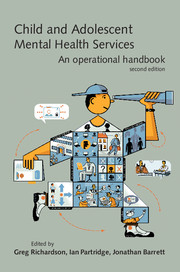Book contents
- Frontmatter
- Contents
- Tables, boxes and figures
- Contributors
- Abbreviations
- Preface
- 1 Introduction
- 2 CAMHS in context
- 3 CAMHS and the law
- 4 Structure, organisation and management of CAMHS
- 5 Evidence-based practice
- 6 Clinical governance
- 7 Education, supervision and workforce development
- 8 Multidisciplinary working
- 9 User and carer participation and advocacy
- 10 A comprehensive CAMHS
- 11 Referral management
- 12 Demand and capacity management
- 13 Strategies for working with Tier 1
- 14 Structuring and managing treatment options
- 15 CAMHS in the emergency department
- 16 Paediatric liaison
- 17 Self-harm
- 18 Learning disability services
- 19 Services for autism-spectrum disorders
- 20 Attentional problems services
- 21 Eating disorder teams
- 22 Bereavement services
- 23 CAMHS for refugees and recent immigrants
- 24 CAMHS and looked-after children
- 25 Drug and alcohol teams
- 26 Parenting risk assessment service
- 27 Court work
- 28 Tier 4 options
- 29 In-patient psychiatric care
- 30 Forensic services
- 31 Neuropsychiatry and neuropsychology services
- 32 Mental health provision for deaf children: study of a low-incidence service provision
- 33 Chief Executives – what do they want and how do they get it?
- Index
22 - Bereavement services
Published online by Cambridge University Press: 02 January 2018
- Frontmatter
- Contents
- Tables, boxes and figures
- Contributors
- Abbreviations
- Preface
- 1 Introduction
- 2 CAMHS in context
- 3 CAMHS and the law
- 4 Structure, organisation and management of CAMHS
- 5 Evidence-based practice
- 6 Clinical governance
- 7 Education, supervision and workforce development
- 8 Multidisciplinary working
- 9 User and carer participation and advocacy
- 10 A comprehensive CAMHS
- 11 Referral management
- 12 Demand and capacity management
- 13 Strategies for working with Tier 1
- 14 Structuring and managing treatment options
- 15 CAMHS in the emergency department
- 16 Paediatric liaison
- 17 Self-harm
- 18 Learning disability services
- 19 Services for autism-spectrum disorders
- 20 Attentional problems services
- 21 Eating disorder teams
- 22 Bereavement services
- 23 CAMHS for refugees and recent immigrants
- 24 CAMHS and looked-after children
- 25 Drug and alcohol teams
- 26 Parenting risk assessment service
- 27 Court work
- 28 Tier 4 options
- 29 In-patient psychiatric care
- 30 Forensic services
- 31 Neuropsychiatry and neuropsychology services
- 32 Mental health provision for deaf children: study of a low-incidence service provision
- 33 Chief Executives – what do they want and how do they get it?
- Index
Summary
‘To the bereaved nothing but the return of the lost person can bring true comfort; should what we provide fall short of that it is felt almost as an insult.’
John BowlbyIntroduction
Bereavement is not a pathological process, but can lead to a significant mortality and morbidity. Some children may suffer significant psychological consequences (Pettle-Michael & Lansdown, 1986) but depression is rare (Pfeffer et al, 2000). The evidence for the efficacy or usefulness of therapeutic work is limited (Harrington & Harrison, 1999; Currier et al, 2007). Research suggests that positive outcomes from therapeutic work are more likely to be achieved if certain groups of children are selected and provided ‘timely’ treatment (Currier et al, 2007). The corollary of this is that many children do well with family and community support and never need to see child mental health services (Dyregov, 2008).
Indications for bereavement work
Children may need support at times of family bereavement. There are a number of reasons the impact of bereavement on the development of children might be more pronounced.
• Bereavement may be associated with circumstances in which the normal supportive family influences are severely hampered; such circumstances include parental mental illness (Van Eerdewegh et al, 1985), catastrophic parental bereavement responses, and emotionally abusive or neglecting parents (Elizur & Kaffman, 1983; Bifulco et al, 1987).
• Severe psychological trauma associated with the death, including parental suicide (Wright & Partridge, 1999; Pfeffer et al, 2000; Department of Health, 2008).
• Repeated bereavement.
• Prolonged disruption to the child's life.
• Family system changes (Wasserman, 1988).
• Extreme circumstances such as war (Goldstein et al, 1997).
Managing bereavement
Childhood bereavement services look at the effects of bereavement on children in a number of ways.
• Diagnostically: bereavement can lead to emotional or behavioural problems that have social or educational effects and that represent a diagnosable entity.
• Adult mental health: there may be effects on the parenting available to the child before or after the bereavement.
• Child protection: bereavement may upset parents’ emotional or physical care of a child.
• Systemically: there may be systemic effects that represent risk factors for the child.
• Developmentally: the circumstances surrounding the bereavement may damage the child's development.
• Attributionally: beliefs and attributions regarding the death, in either the child or the family, may be damaging.
- Type
- Chapter
- Information
- Child and Adolescent Mental Health ServicesAn Operational Handbook, pp. 207 - 213Publisher: Royal College of PsychiatristsPrint publication year: 2010



